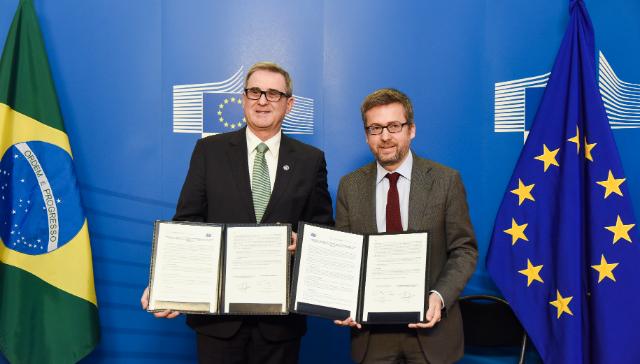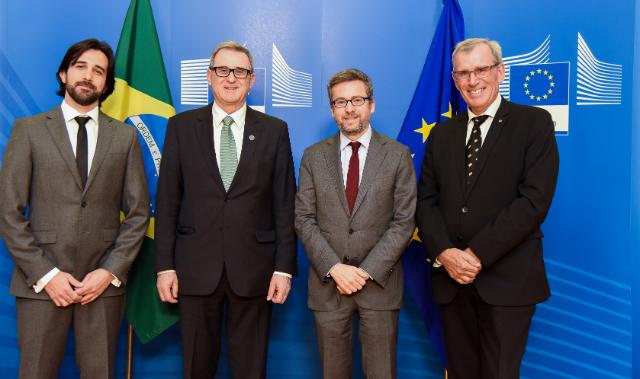EU-Brazil agreement encourages top Brazilian researchers to join ERC teams in Europe
Carlos Moedas (EC) Sergio Luiz Gargioni (CONFAP) signed an agreement aimed at fostering international collaboration between top Brazilian and ERC-funded researchers
News
- Posted on: Oct 14, 2016
- Belgium
- Important
Website: Link
Contact: Marcin Mońko,
Yesterday, 13th October 2016, an initiative aimed at fostering international collaboration between top Brazilian and ERC-funded researchers was launched in Brussels: the European Union and Brazil signed an agreement to encourage young Brazilian scientists to join ERC-grantees' research teams, conducting frontier research across Europe.
The Commissioner for Research, Science and Innovation, Carlos Moedas, and the President of the Brazilian National Council of State Funding Agencies (Confap), Sergio Luiz Gargioni, signed the deal (“implementing agreement”) in the presence of Prof. Klaus Bock, ERC Vice-President.
On the occasion of the signing, Commissioner Moedas said:
"The agreement signed today is happy news for global science cooperation and very much in line with our strategy 'Open to the World'. Top science is inherently international and this initiative will encourage this mind-set further. Young Brazilian talent can join forces with grantees of the European Research Council across Europe, which will help to push their research further and give them the opportunity to gain international experience. It will clearly benefit both the European teams and the bright minds coming from Brazil."
Prof. Klaus Bock also welcomed the initiative:
"We are very pleased with this new addition to the many international initiatives launched with our counterparts around the globe over the last few years. It is clear to the ERC that scientific talent needs to interact and work closely together. Scientific exchange at top level is extremely valuable and may well lead to further scientific advancements which will benefit all."
The video of the signing ceremony is available here


More pictures are available here
Background
The agreement (so called 'implementing arrangement') resonates with the overall "ERC - is Open to the World" strategy. The ERC awards grants to researchers of all nationalities if they undertake their projects in the countries of the European Research Area (ERA) that includes EU Member States and Associated Countries. It is important to enhance awareness of such possibilities among non-European researchers and to facilitate them in joining an ERC-funded project. The signed agreement thus has as its goal to enable Brazilian top researchers to undertake research visits and cooperate with ERC-supported teams in the ERA. It is also a step forward on the implementation of the EU - CELAC Common Research Area, focusing on researchers' mobility.
The first initiative of this kind was signed in July 2012 with the US (National Science Foundation, NSF) to provide opportunities for NSF researchers to join ERC-funded teams. This was followed by similar agreements with South Korea (National Research Foundation of Korea, NRF) in November 2013, Argentina (National Scientific Technical Research Council, CONICET) in March 2015, Japan (Japan Society for the Promotion of Science, JSPS) in May 2015, China (National Natural Science Foundation of China, NSFC) in June 2015, South Africa (National Research Foundation, NRF) in October 2015 and Mexico (Mexican National Council of Science and Technology, Conacyt) in November 2015.
Set up by the European Union in 2007, the European Research Council is the first European funding organisation for excellent frontier research. Every year, it selects and funds the very best, creative researchers of any nationality and age, to run five-year-projects based in Europe.
